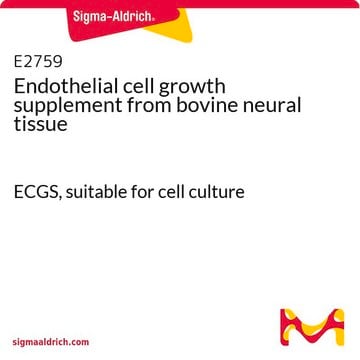M8537
MCDB 131 Medium
With ʟ-glutamine, without sodium bicarbonate, powder, suitable for cell culture
Synonyme(s) :
131 Medium, Medium 131, Molecular, Cellular, and Development Biology 131 medium
About This Item
Produits recommandés
product name
MCDB 131 Medium, With trace elements and L-glutamine, without sodium bicarbonate, powder, suitable for cell culture
Forme
powder
Concentration
11.6 g/L
Technique(s)
cell culture | mammalian: suitable
Composants
sodium pyruvate: 0.11 g/L
phenol red: 0.012 g/L
L-glutamine: 1.461 g/L
HEPES: no
glucose: 1.0 g/L (Dextro)
Conditions d'expédition
ambient
Température de stockage
2-8°C
Description générale
Application
- as a component of the basal medium to culture bovine retinal endothelial cells
- to culture bovine lung microvascular endothelial cells
- for the isolation of porcine endocranial endothelial cells and porcine aortic endothelial cells
Quantité
Reconstitution
Souvent commandé avec ce produit
Code de la classe de stockage
11 - Combustible Solids
Classe de danger pour l'eau (WGK)
WGK 1
Point d'éclair (°F)
Not applicable
Point d'éclair (°C)
Not applicable
Certificats d'analyse (COA)
Recherchez un Certificats d'analyse (COA) en saisissant le numéro de lot du produit. Les numéros de lot figurent sur l'étiquette du produit après les mots "Lot" ou "Batch".
Déjà en possession de ce produit ?
Retrouvez la documentation relative aux produits que vous avez récemment achetés dans la Bibliothèque de documents.
Les clients ont également consulté
Notre équipe de scientifiques dispose d'une expérience dans tous les secteurs de la recherche, notamment en sciences de la vie, science des matériaux, synthèse chimique, chromatographie, analyse et dans de nombreux autres domaines..
Contacter notre Service technique







